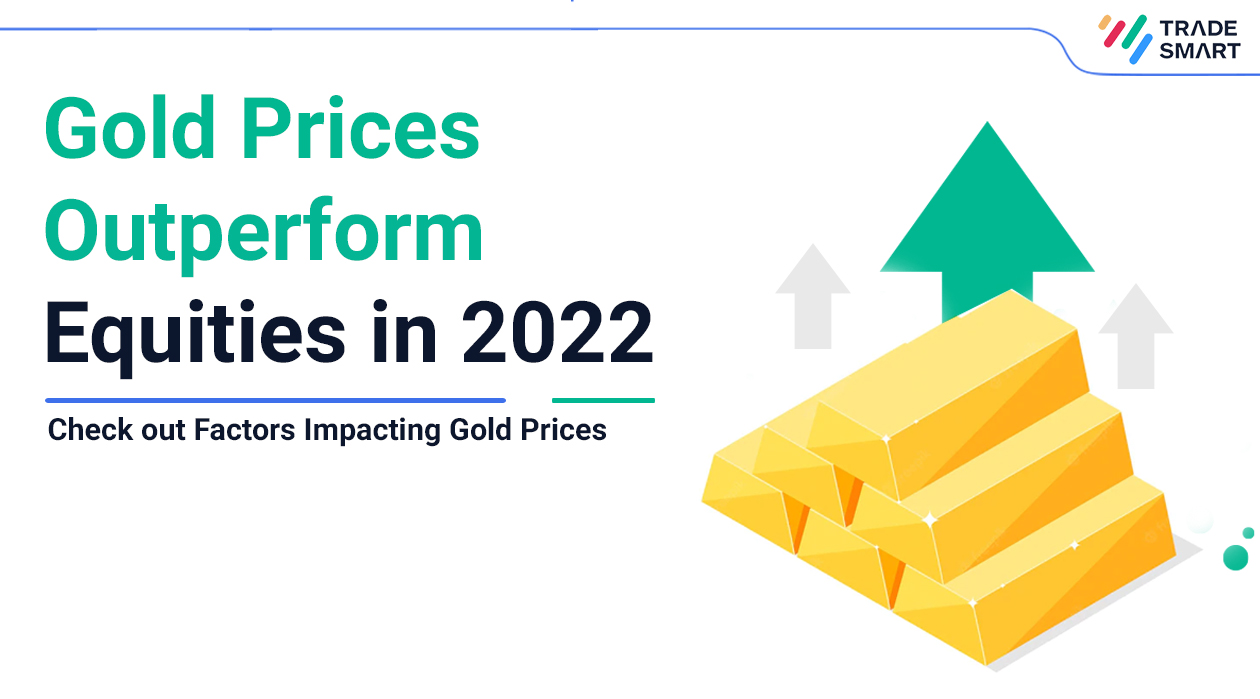
Gold prices in India have risen by around Rs 3,000 per 10 grams in 2022 so far. The bullion prices that hovered near Rs 48,000 in January, are trading near Rs 51,000 in June, witnessing gains of more than 6%. In comparison to this, the equity market has failed to soothe investors’ nerves with an over 10% YTD fall in the benchmark Nifty50 index.
The risky assets globally have given negative returns this year since the beginning of the Russia-Ukraine war that escalated fresh worries among investors. The year has been marked by events including global central banks raising interest rates to combat soaring inflation, supply-chain bottlenecks resulting in a surge in commodities prices, lingering fears of recessions, and deteriorating domestic currency.
All these factors have weighed on Dalal Street investors and shifted their focus on the safe-haven metal, gold. Precious metals tend to perform well amid such global economic uncertainties. Moreover, despite the rising interest rate environment, gold has outperformed the equity market.
India is one of the largest consumers of gold in the world. Not only physical and jewellery demand, but the investment demand for gold is also high in India.
There are multiple factors that impact gold prices.
Here are some of these crucial factors:
Inflation
It is a commonly known fact that gold acts as a hedge against inflation. When inflation rises, the purchasing power, i.e., the value of currency diminishes. During an inflationary period, it is a general mindset of consumers that the value of gold remains stable, and hence, they tend to hold more gold. Therefore, when inflation rises, the prices of yellow metal tend to increase.
Interest rates
Gold prices, generally, move in the opposite direction to the interest rates. Hence, when interest rates fall, demand for gold tends to increase as consumers seek higher returns on investment, which in turn raises the prices of gold. On the contrary, when the interest rates in the economy increase, people tend to sell gold and invest in deposits seeking higher returns. This results in low demand for gold and ultimately falling prices.
Recently, in order to combat high inflation, the Reserve Bank of India (RBI) has hiked its interest rate, in line with the global central banks. This may pressurise the gold prices and the up move is likely to get restricted going ahead.
Currency fluctuations
In the international markets, gold is traded in dollars. Any fluctuations in the US dollar index and the domestic rupee against the greenback have a huge impact on gold prices.
Gold, as an asset, has an intrinsic value that fluctuates over time. Therefore, when the value of the dollar appreciates against other global currencies, gold becomes costlier in other currencies. Hence, the prices of gold are likely to fall when the US dollar rises and vice versa.
In the domestic terms, if the rupee depreciates against the US dollar, the cost of gold will rise in rupee terms. So, when the rupee weakens, gold prices in the domestic market rise, and when the rupee appreciates against the dollar, gold prices are likely to fall.
Meanwhile, the Indian rupee has depreciated nearly 5% this year so far. This has made the import of gold expensive and its impact can be seen on the commodity prices.
Geopolitical factors
Gold is also considered a safe-haven asset worldwide. During a global geopolitical crisis, economic slowdown, or any macroeconomic uncertainty, investors lean towards the yellow metal for investment as compared to other risky asset classes. Thus, increased demand for gold amid turbulent times pushes the prices higher.
On the contrary, when economic growth is higher and there is clarity on the macroeconomic conditions, investors shift towards equities and other asset classes in search of higher returns.
The ongoing Russia-Ukraine war and its impact on global trade and the economy have kept gold prices higher in this year.
Import duty
India is one of the largest consumers of gold in the world and a majority of India’s gold demand is met through imports. The government imposes import duty on gold. Hence, any change in such import duties impact domestic gold prices.
Central banks
The central banks around the globe, hold gold reserves in huge quantities. If the central banks decide to buy more gold and increase their gold reserves, the demand for the metal will rise, impacting its prices positively. Also, if the central banks sell gold from their reserves, the prices will fall.











